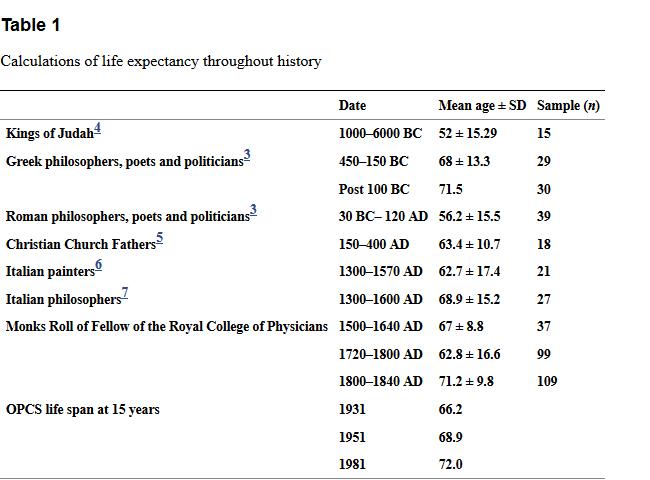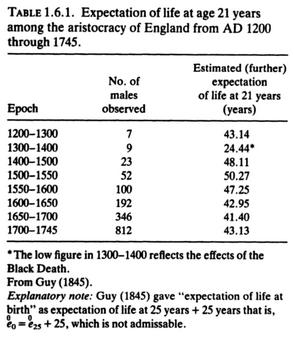How Long Did Our Ancestors Live? June 13, 2016
Author: Beach Combing | in : Ancient, Contemporary, Medieval, Modern, Prehistoric , trackback
Life expectancy is a tricky thing. Every demographer knows that, in the modern world, the difference between a national life expectancy of 40 in country A and 70 in country B is predominantly about how many children die in their early years of life. If you look at life expectancy for fifteen year olds then the numbers will be much closer. Looking back at life expectancy in history is, of course, a much more difficult matter. How do you measure life expectancy at fifteen in the Roman Empire, or, for that matter, in the Paleolithic caves? We have severe problems in seventeenth-century Europe with surviving parish registers… However, what is most striking to a casual outsider is the basic continuity of the three score years and ten: or at least three score years.
If you strip out infant deaths, and ignore periods of unnaturally high mortality (Black Death, World War II in Poland etc) then there are very few periods when, the graphic* above suggests, life expectancy falls dramatically below sixty. Of course, Roman politicians, Church fathers and Italian painters are not necessarily standard fare: but if three such different groups offer such similar results (albeit with a small sample) then perhaps we are coming close to a human truth here.

Other small samples are provided for the English aristocracy in the Middle Ages.** Here life expectancy at twenty one is also about sixty (you need to add 21 to the figures). Even the speed bumps in human history are surprisingly unimportant in the great scheme of things. Life expectancy falls in the Neolithic period as human beings settle for the first time; and, again, in the industrial revolution as food consumption narrows in range and quality. There are massive differences, for the worse, in terms of height and also in terms of teeth quality in those periods: but adults seem to end up living between two and five years shorter lives, small change really.
Many surveys make claims closer to fifty for life expectancy at fifteen for the Roman period and for the Stone Age. Beach would be suspicious. He’d prefer to go with the small samples above, based though on definite texts rather than archaeologists comparing skeletal remains. Other data sets for understanding mortality? Drbeachcombing AT yahoo DOT com
Looked at like this there are only three really important changes in life expectancy in history all of which have taken place in the last century: (i) the number of infant deaths starts to fall dramatically; (ii) women begin to live longer than men (as childbirth is made safe); (iii) we start to push beyond sixty towards eighty.
*Griffin, Changing Life Expectancy, J R Soc Med. 2008 Dec 1; 101(12): 577
**H.O.Lancaster, Expectations of Life: A Study in the Demography, Statistics, and History of World Mortality (1990)
KMH, 30 June 2016, As an actuary, I am glad to see your interest in demography and its findings. I would say there some ethnic groups such as the Hunzas who have unusual longevity, due to their genetics, environment and culture. Other examples, identified as “blue zones” include Okinawans, Sardinians, and residents of Loma Linda, CA. To quote Wikipedia, The people inhabiting Blue Zones share common lifestyle characteristics that contribute to their longevity. The Venn diagram at the right highlights the following six shared characteristics among the people of Okinawa, Sardinia, and Loma Linda Blue Zones: Family – put ahead of other concerns; Less smoking; Semi-vegetarianism – except for the Sardinian diet, the majority of food consumed is derived from plants; Constant moderate physical activity – an inseparable part of life; Social engagement – people of all ages are socially active and integrated into their communities; Legumes – commonly consumed. So, your demographic averages don’t tell the whole story – a high degree of variation in longevity can exist due to various factors. Perhaps one unrecognized factor is relative isolation from others. Okinawa and Sardinia are islands, and the Hunza homeland is hard to get to. The older people become, the more interesting the questions of longevity become. LTM reminds me that I forgot the ages from the Old Testament: now they lived a long time… https://en.wikipedia.org/wiki/Genealogies_of_Genesis


